Are you an avocado aficionado with a sensitive gut? You’re not alone. Many individuals with irritable bowel syndrome (IBS) wonder if avocado is still a superfood for them. In this article, we’ll dive into the intersection of avocado and IBS to help you make informed dietary choices.
Are you one of the millions of people with IBS who also loves avocados? You’re not alone. Avocado has earned its reputation as a nutrient-packed superfood. But here’s the twist: is it still considered a superfood when it comes to IBS? We’re about to find out.
We’ll explore the relationship between avocados and IBS. You’ll discover the nutritional profile of avocados, potential benefits, and risks for those with IBS, and expert insights from gastroenterologists and dietitians.
If you have irritable bowel syndrome (IBS), you’ll learn how to incorporate avocados into your diet without triggering uncomfortable symptoms. Did you know that a small amount of avocado is generally considered low FODMAP and safe for most people with IBS? The trick is in the portion size and personal tolerance.
So, if you’re an IBS sufferer who wants to eat your avocados, keep reading. By the end, you’ll have a clear understanding of whether avocados can still be your gut-friendly superfood or if they might be better enjoyed in moderation.
- Related: IBS Diet With Fruit
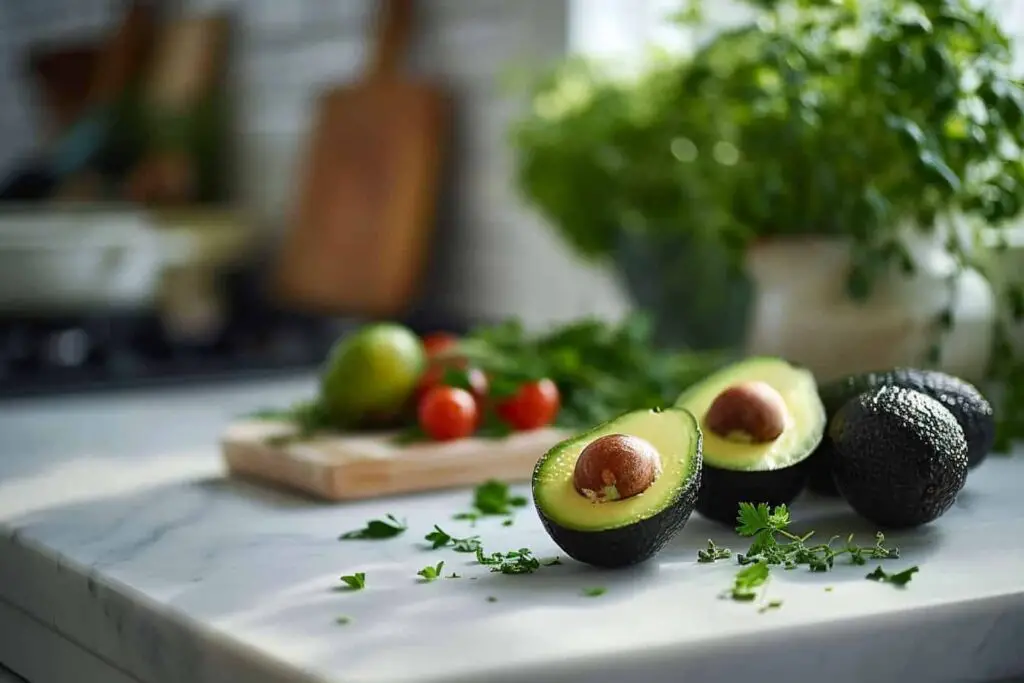
7 Key Takeaways
- IBS is a common digestive disorder that affects 10-15% of people, but it’s not life-threatening.
- Diet plays a crucial role in managing IBS, and a well-balanced approach can significantly impact symptoms.
- Avocados are a nutritional powerhouse, offering fiber, healthy fats, and essential nutrients.
- Avocado is generally low in FODMAPs and can even boost gut microbiota diversity, making it a potential ally for IBS.
- However, avocados can be high in FODMAPs in larger amounts and may cause gas, bloating, or diarrhea for some.
- It’s important to tailor avocado intake to your IBS subtype, pair it with other gut-friendly foods, and listen to your body’s response.
- Working with a healthcare professional or registered dietitian is key to creating a personalized IBS diet plan, including whether avocados are a good fit for you.
Understanding IBS: A Brief Overview
IBS is a common digestive disorder that affects around 10-15% of people, making it one of the most prevalent gut conditions out there. It’s a chronic condition, meaning it’s long-term, but it’s not life-threatening.
So, what’s happening in the digestive system when someone has IBS? Well, it’s a bit of a mystery. Experts think it may be due to a combination of factors, including abnormal muscle contractions in the intestines, heightened sensitivity to certain foods, and even stress. The result is a medley of uncomfortable symptoms.
Common IBS Symptoms and Triggers
- Abdominal pain or cramping
- Bloating and gas
- Diarrhea or constipation (or both, in some cases)
- Changes in bowel habits
The Importance of a Well-Balanced Diet in Managing IBS
While there isn’t a one-size-fits-all diet for IBS, what you eat can significantly impact your symptoms. Here are a few tips:
- Keep a food diary: Track what you eat and how it makes you feel to identify potential triggers.
- Fiber is your friend: Gradually increasing your fiber intake can help regulate bowel movements. Opt for soluble fiber sources like oats, flaxseeds, and psyllium.
- Watch out for FODMAPs: These are types of carbohydrates that some people with IBS find hard to digest. Common FODMAP foods include onions, garlic, wheat, and some fruits. A low-FODMAP diet may help alleviate symptoms.
- Stay hydrated: Drinking enough water can prevent constipation and promote healthy digestion.
IBS is a complex condition, but with some dietary tweaks, you can manage your symptoms and live a full life with avocados. Just remember, what works for one person may not work for another, so it’s important to consult with a healthcare professional or a registered dietitian to find your personalized IBS game plan.
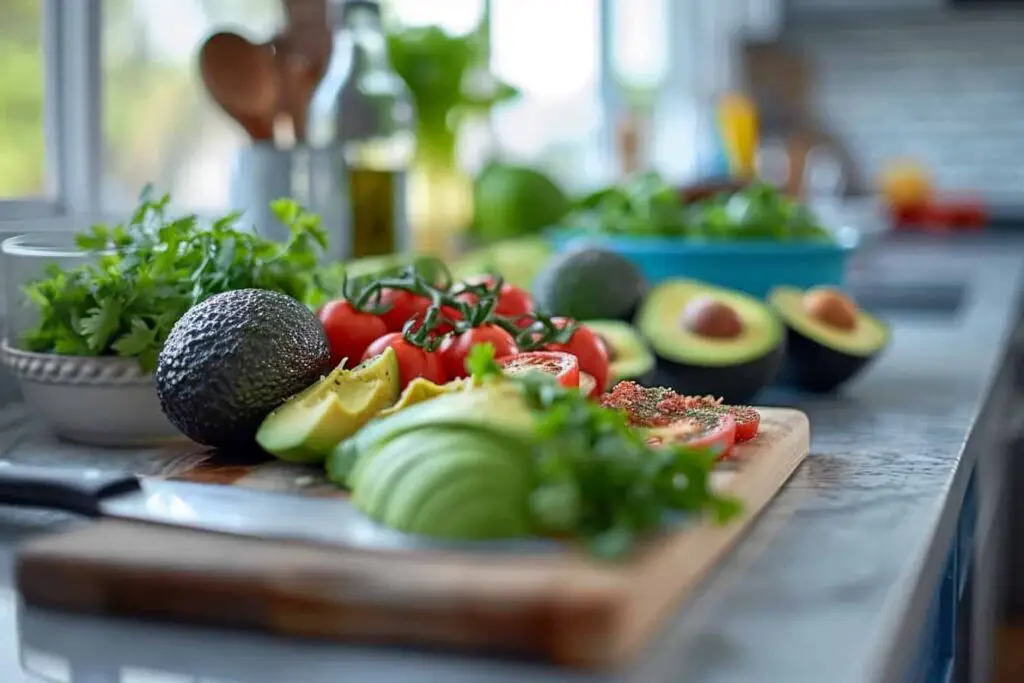
Nutritional Profile of Avocados
Avocados are more than just a trendy toast topper; they’re a nutritional powerhouse. Here’s a closer look at what makes them so special as a source of nutrition:
- Calories: A 50-gram serving of avocado contains about 80 calories, making it a satisfying addition to any meal.
- Fat: Avocados are a rich source of heart-healthy monounsaturated fats, with around 7 grams per serving.
- Sodium: They’re naturally low in sodium, which is great for those watching their salt intake.
- Carbohydrates: While avocados do contain carbs (about 4 grams per serving), their high fat content makes them a popular choice in lower-carb diets.
- Fiber: Avocados pack in about 3 grams of fiber per serving, which supports healthy digestion and can help keep you feeling full.
- Sugars: Avocados have minimal sugar content, making them a suitable choice for those monitoring their sugar intake.
- Protein: While not a significant source of protein, avocados do contribute a small amount (about 1 gram per serving).
But the benefits of avocados doesn’t stop there. They also offer a range of essential nutrients:
- Magnesium: A serving of avocado provides around 4% of your daily magnesium needs, which is important for nerve and muscle function.
- Potassium: With about 6% of your daily potassium needs per serving, avocados can help support healthy blood pressure levels.
- Vitamins: Avocados contain a medley of vitamins, including vitamin C, vitamin E, and vitamin K, all of which play key roles in overall health.
The high fiber content in avocados is a great plus. Insoluble fiber is essential for healthy digestion, and avocados provide a good dose of it. The monounsaturated fats in avocados have also been associated with potential anti-inflammatory effects, which can further support gut health.
Avocados also contain enzymes that may aid digestion. One such enzyme, lipase, helps break down fats, which can be especially helpful for individuals with conditions like IBS or difficulty digesting fats.
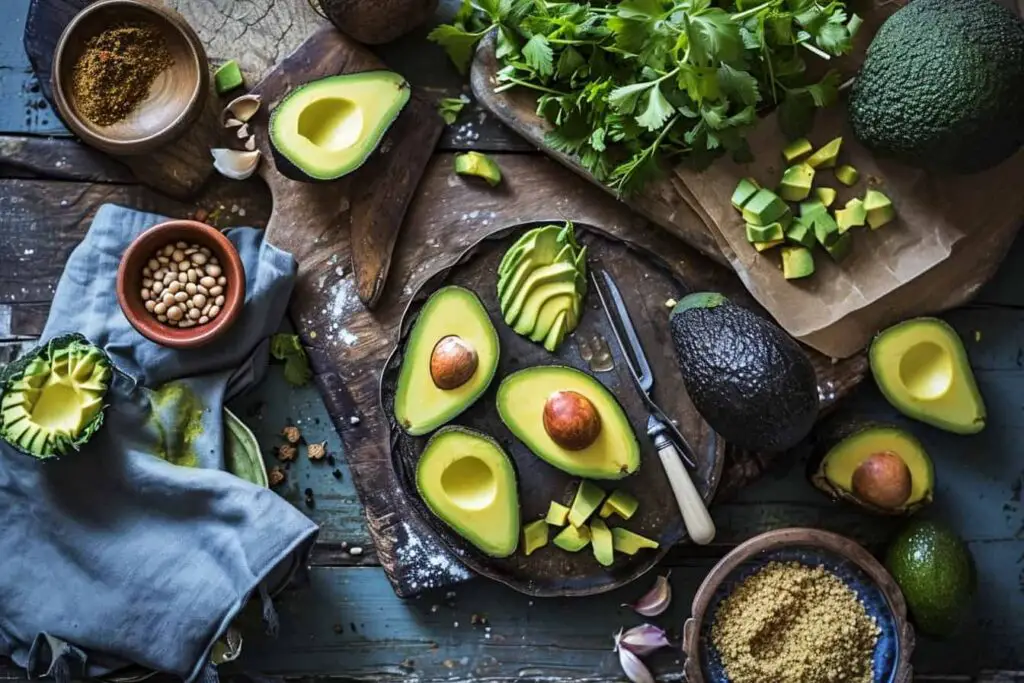
Avocado and IBS Relationship
Avocado is a potential ally in managing IBS symptoms. Research suggests that a moderate intake of avocado, about 30 grams or 1 ounce, is low in FODMAPs (fermentable oligosaccharides, disaccharides, monosaccharides, and polyols) and unlikely to trigger IBS symptoms. This makes it a versatile and gut-friendly food option for those with IBS.
One study even found that consuming avocado increased the diversity of gut microbiota, which could have a positive impact on IBS symptoms. The presence of FODMAPs in avocados is not a deal-breaker for most people with IBS, as long as the intake is limited.
Here’s why avocado gets a thumbs-up for IBS:
- Low-FODMAP: Avocado’s FODMAP content is generally well-tolerated in small portions, making it a safer choice for those with IBS.
- Gut Microbiota: Avocado’s potential to boost gut microbiota diversity is a promising advantage for managing IBS symptoms.
- Low-Fructose: Unlike many other fruits, avocados are low in fructose, reducing the likelihood of causing gas and bloating.
However, it’s important to note that IBS is different from person to person. While avocado is generally well-tolerated, some individuals may still find it triggers symptoms. It’s always a good idea to work with a registered dietitian to personalize your IBS diet and identify any potential trigger foods.
Risks of Avocado for IBS
While avocados are often hailed as a superfood, they may not be the best choice for everyone with IBS. Here’s why:
- High FODMAP in Large Amounts: Avocados contain polyols, specifically sorbitol, which can trigger IBS symptoms like gas, bloating, and diarrhea. The Monash University Low FODMAP Diet App categorizes avocados as high in FODMAPs when consumed in servings larger than 1 oz. So, if you’re particularly sensitive to FODMAPs, it’s important to moderate your avocado intake.
- “Gassy” Vegetable: While avocados are a nutritious fruit, they have a higher fat content and lower sugar content than most fruits. This can make them a bit “gassier” for some people, especially those with IBS. If you’ve noticed increased gas or bloating after eating avocados, it might be worth cutting back or exploring other low-FODMAP fruits.
- High Fiber Content: Avocados are an excellent source of dietary fiber, which is generally great for gut health. However, for individuals with IBS who are prone to constipation, the high fiber content in avocados can potentially exacerbate symptoms. If you find that avocados are causing you discomfort, it could be due to their fiber content.
While avocados offer a plethora of health benefits, they may not be suitable for everyone with IBS. If you’re an avocado lover and want to incorporate them into your diet, let’s take a look at how to incorporate avocados into your daily diet.
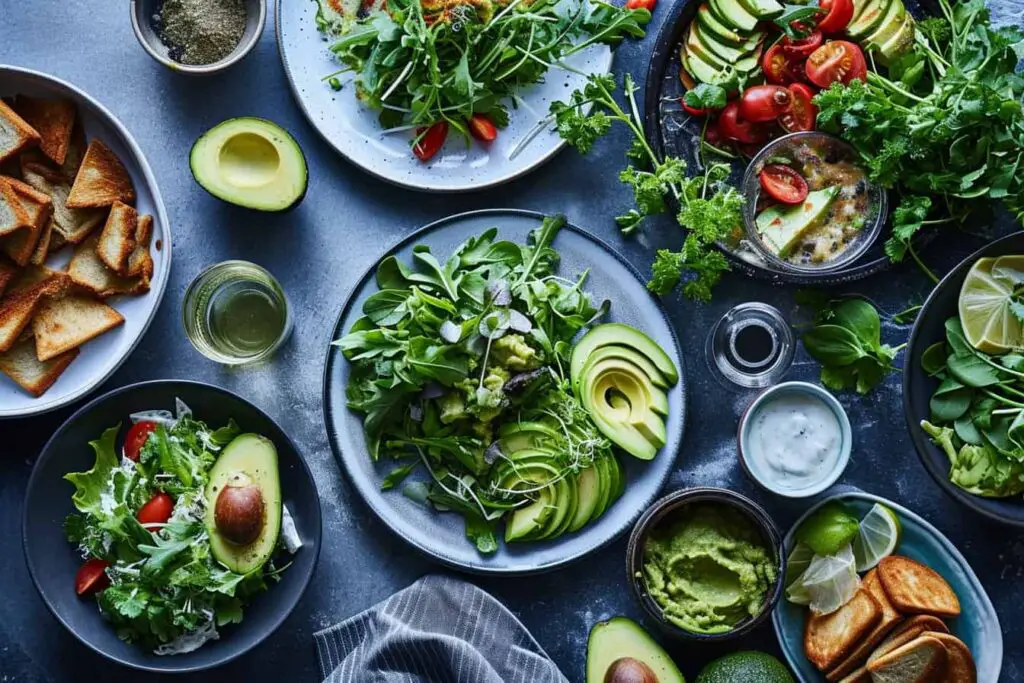
How to Incorporate Avocados into an IBS-friendly Diet
Avocados can still be your green, creamy friend if you have IBS. Here’s how to make it work and the suggested dietary modifications:
- Preparing Avocado: Opt for ripe, creamy avocados that are easier to digest. Avoid underripe or overripe ones that may upset your stomach.
- Tailoring to IBS Subtypes: If you have diarrhea-predominant IBS (IBS-D), try mashing or blending avocado into a smoothie, fruit juice, or soup for easier digestion. For constipation-predominant IBS, enjoy avocado slices on whole grain toast for added fiber.
- Portion Control: Start with small amounts, like 1/8 to 1/4 of an avocado per day. This falls within the low-FODMAP range, making it generally safe for IBS. Monitor your symptoms and adjust accordingly.
- Balanced Pairings: Combine avocado with other low-FODMAP, gut-friendly foods like cooked vegetables, lean proteins, or whole grains. This helps create a more balanced meal and reduces the risk of triggering IBS symptoms.
- Medication Considerations: While avocados are generally safe to eat alongside IBS medications, it’s always a good idea to consult with your healthcare provider to rule out any potential interactions.
- Listen to Your Body: As with any new food, start with a small amount and gradually increase if tolerated. Monitor your symptoms closely to ensure avocado agrees with your gut.
Avocados are generally well-tolerated, but it’s essential to test your individual tolerance and look for gastrointestinal symptoms. If you notice any adverse effects, it may be best to limit or avoid them.
Avocados can still be a part of your IBS-friendly diet, thanks to their low-FODMAP status and potential gut benefits. Just keep portion sizes in check, pair them wisely, and always listen to your body’s response.

Expert Insights: What Gastroenterologists and Dietitians Say
When it comes to IBS, the role of diet cannot be overstated. Gastroenterologists and dietitians are the go-to experts for understanding how different foods can impact IBS symptoms, and their insights on avocados are worth noting.
- Avocado: A Gut-Friendly Superfood or a Trigger?
- While avocados are generally considered a nutritious food, they may not suit everyone with IBS. Some individuals find avocados soothing, thanks to their healthy fat content, while others report increased bloating and gas.
- Dr. Lisa Richards, a registered dietitian and gut health expert, advises, “The best way to know if avocados work for you is to start with small portions and observe your body’s response.”
- Moderation and Pairing: The Key to Avocado Success
- Gastroenterologist Dr. John Thompson suggests, “If you enjoy avocados, try having them in smaller portions and pairing them with other IBS-friendly foods like rice or lean proteins.”
- Dietitian Emma Johnson adds, “For some IBS patients, avocado may be better tolerated when it’s mashed or blended, like in guacamole or smoothies.”
- Individualized Approach: Your Gut, Your Rules
- Both experts emphasize the importance of an individualized approach to IBS management. What works for one person may not work for another.
- Dr. Thompson notes, “Avocado is just one piece of the puzzle. It’s crucial to work with a healthcare professional to create a personalized IBS diet plan.”
- IBS-Friendly Alternatives to Avocado
- If avocados don’t agree with you, don’t fret. There are plenty of other gut-friendly options to explore, such as cooked zucchini, butternut squash, or even pureed pumpkin.
- Dr. Richards advises, “Don’t feel pressured to include avocados if they don’t work for you. The goal is to find a range of nutritious foods that nourish your gut without causing distress.”
In a nutshell, avocados can be a part of an IBS-friendly diet for some individuals, while others may need to approach them with caution. The key is to listen to your body, start with small portions, and work with a healthcare professional to create a diet plan that suits your unique needs.
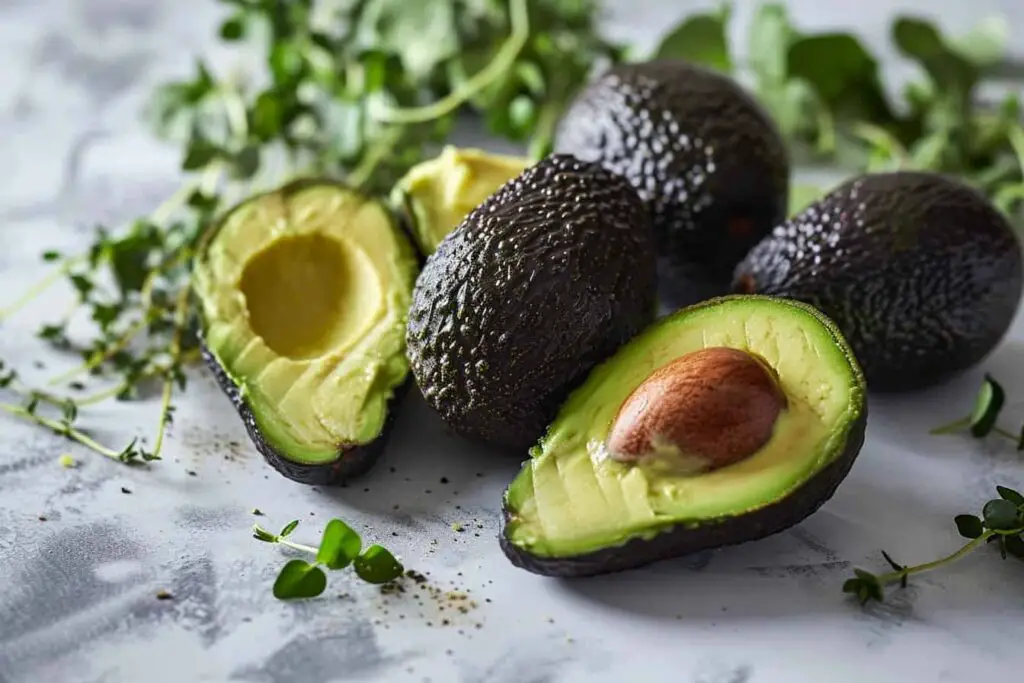
Avocados and IBS Final Thoughts
Avocado’s potential as a gut-friendly superfood for individuals with IBS is exciting, but it’s not a one-size-fits-all solution. Its rich nutrient profile, high fiber content, and potential anti-inflammatory properties make it a strong contender for inclusion in an IBS-friendly diet. However, as with any food, moderation and individual tolerance are key.
While research suggests that avocado is generally well-tolerated in small portions and may even offer gut health benefits, it’s essential to listen to your body and work with a healthcare professional or registered dietitian to create a personalized IBS diet plan.
To avocado or not to avocado? Moderation, portion control, and individual tolerance are key. By being mindful and in tune with your body, you can make well-informed choices about whether avocado is still a superfood for your IBS journey.
So, go ahead and enjoy your avocados, but always do so with the guidance of a healthcare professional and in consideration of your unique IBS needs.
Check out these other foods to see if they’re good or bad for IBS:
- https://www.niddk.nih.gov/health-information/digestive-diseases/irritable-bowel-syndrome/symptoms-causes
- https://www.niddk.nih.gov/health-information/digestive-diseases/irritable-bowel-syndrome
- https://www.niddk.nih.gov/health-information/digestive-diseases/irritable-bowel-syndrome/definition-facts
- https://medlineplus.gov/ency/article/000246.htm
- https://www.ncbi.nlm.nih.gov/pmc/articles/PMC7794700/
- https://www.health.harvard.edu/a_to_z/irritable-bowel-syndrome-ibs-a-to-z


